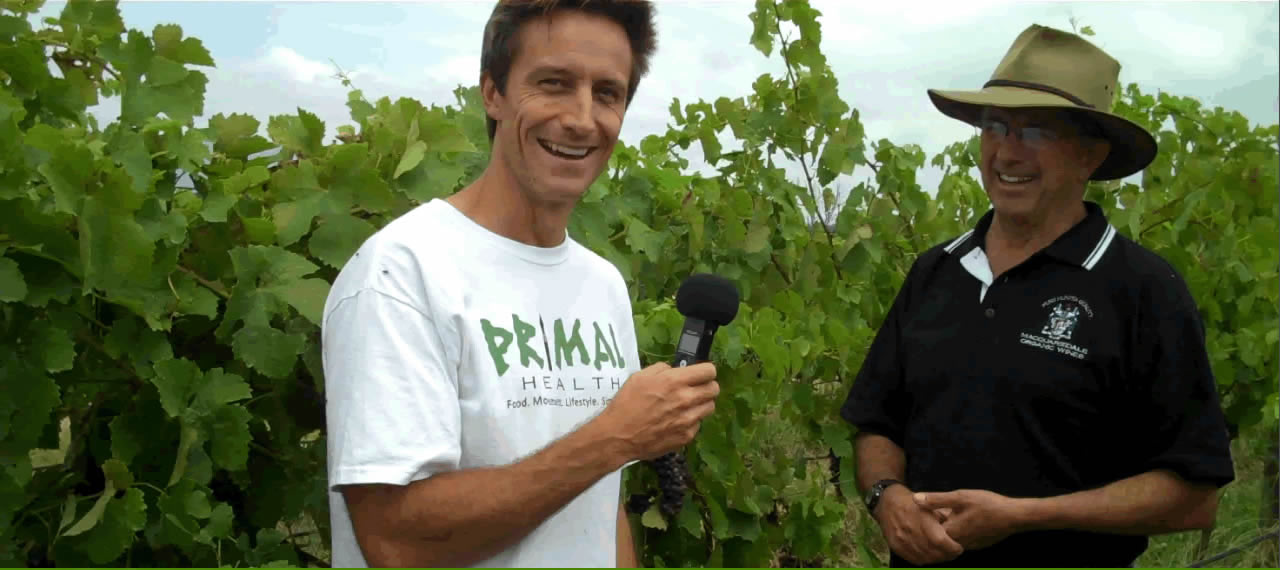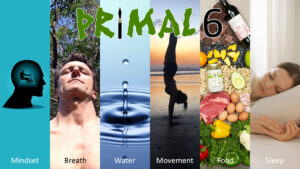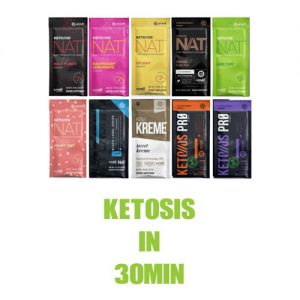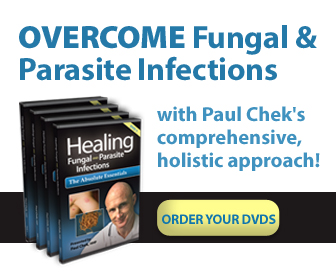Continued from: ‘Is Biodynamic Organic Wine Healthier? – Part 1‘.
Brad:
Okay guys, we’re out here at Shiraz vineyard at Macquariedale Biodynamic wines with Ross McDonald. Ross can you explain to us what the key differences are between Biodynamic farming within your vineyard in comparison to commercial farming?
Ross:
The key thing is that we spray a product called BD500. It is a humus like material that is made from cow manure which is put in the cow horns and left underground over winter and then pull it out and then we make it into a homeopathic solution. About 80 grams per acre we use, which is just the size of inside your hand. We spray that out over the vines. And it really encourages the bacteria fungi in the soil and the whole biodynamic approach is about improving the fertility of the soil. Not using synthetic chemicals and as you can see from this (pointing to the grapes) we have a great bunch of shiraz here which is going through the verasion at the moment. That is the color change from green to black. That will be the part of Shiraz 2012 vintage.
Brad:
That’s good. I have already been eating them and they taste fantastic! You were also talking before about the size of the actual fertiliser. BD500? That’s all that is required to do the whole vineyard.
Ross:
Yes
Brad:
Wow!
Ross:
So we use about 80 grams per acre for the vineyard.
Brad:
80 grams per acre! That’s pretty powerful stuff guys. And so another part of biodynamic farming?
Ross:
Okay there are the other part we talked about is the diversity in the vineyard. If you are going to a conventional vineyard, nothing is growing. They really try and nuke everything. As you can see in our vineyard, we have a kind of weed mat under the vines themselves and in the middle of the rows of the vines we plant what we call cover crops. Those cover crops are really based on legumes – we plant peas and beans, clover, vetch. All these type of legumes which allow us to access the nitrogen out of the air. Everybody knows that its about 80 percent nitrogen in the air and these plants are able to put it in the root systems so it goes into the soil and the vines, the beautiful vines access that. That’s how we source Nitrogen for the vines.
Brad:
Wow. That is fascinating stuff guys. Once you start learning a little bit more about Biodynamic farming. We probably talked for about 20 minutes to condense something into this video. Ross, what would be the third main thing about Biodynamic Farming you wanted to share?
Ross:
The third main thing is allowing the natural compost to occur. Part of Biodynamics is making compost using the other preparations which is 502 and 507 which is based on valerian, nettle, oakbark etc and those small quantities are put into the compost. We then put some the compost out into the vineyard. We also do some natural composting in the vineyard by throwing the soil from the middle of the row under the vine and allowing that to break down to form a compost. And you can see from this, there is a great diversity of products happening here.
Brad:
Ross one other thing I want you to mention is the analogy you use with regards to herbicides, fungicides bodybuilding type stuff…
Ross:
Look, one other thing that is always raised is the question about synthetic fertilizers, that is the NPK fertilizers. Now the NPK fertilizers add a lot of nitrogen, potassium and phosphorous to the soil and the plants go green and big and they develop lots of fruit and that. But each year you’ve got to keep adding that because the plants are like on steroids. They built massive, massive structures. The leaves they form also brings disease. So the farmer then has got this massive crop and potential disease issues. Then he’s got to spray the systemic chemicals. All our vines grow naturally very much like it is been growing since few thousand years. So there’s no synthetic fertilisers, they are just doing it naturally. We firmly believe that at the end of the day we get better fruit out of that. More flavorsome, more nutrition and it makes better wine.
Brad:
So there you have it guys, that’s all a quick run-down on Biodynamic farming here at Macquariedale Biodynamic wines. Like I said in the first video if you are keen to get your hands on some of the Ross’s fantastic wines, go to macquariedale.com.au or come down to the Hunter Valley and do a bit of a wine tasting yourself and a chat with Ross. (Ross: Thank you very much) No worries Ross. Thanks.
Missed the first part? Check out ‘Is Biodynamic Organic Wine Healthier? – Part 1‘.
Is Biodynamic Organic Wine Healthier? – Part 2 – March 2015








